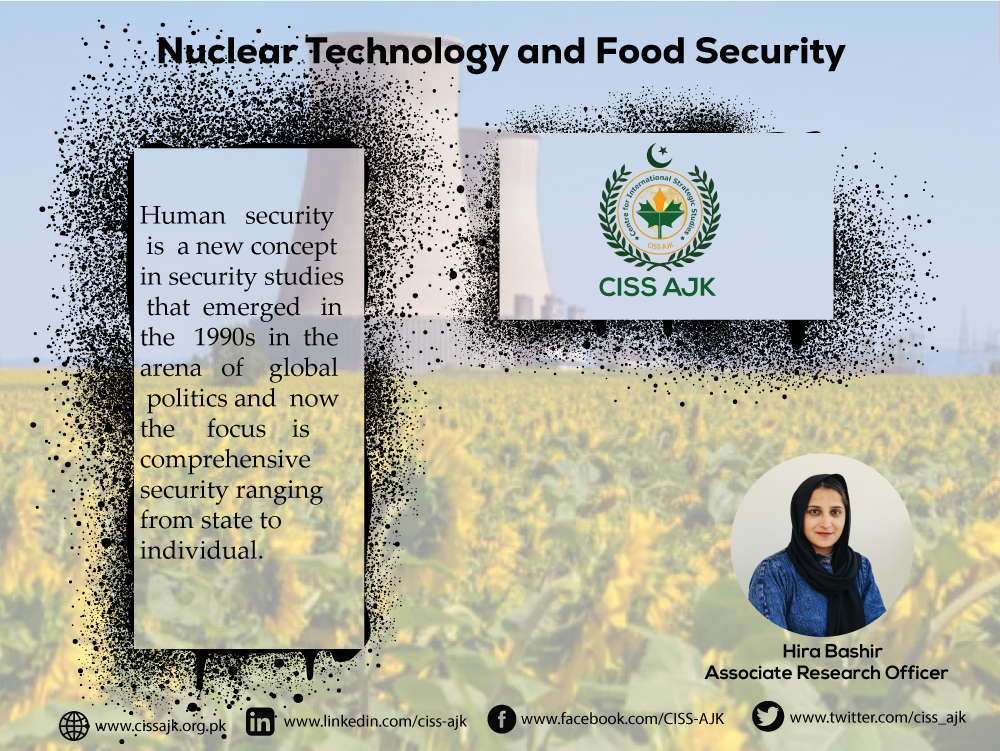812
Human security is a new concept in security studies that emerged in the 1990s in the arena of global politics and shifted the focus of security studies from state-centric to human-centric. The concept has evolved to prioritize the well-being of individuals. According to the United Nations Human Development Report 1994, human security encompasses challenges and threats in seven key areas: economic security, food security, water security, health security, and environmental security.

Pakistani people face several of these threats, especially in the context of climate change and this impacts food security. According to the 2022 Global Food Security Index (GFSI), Pakistan is the 5th most vulnerable country in the world concerning climate change.Nuclear technology is used to induce mutations in crops to develop new and improved varieties. In this process, seeds are exposed to radiation, which causes changes in the DNA of the plant. These mutations can result in desirable traits such as improved yield, resistance to pests and diseases, and tolerance to drought or salinity. By developing new crop varieties with improved characteristics such as increased yield, resistance to pests and diseases, and tolerance to environmental stresses like drought or salinity, agricultural productivity can be enhanced. This can help ensure an adequate and stable food supply, reducing the risk of hunger and improving food security for communities and nations. Nuclear technology also irradiates food to control spoilage and extend shelf life. Irradiation can also be used to eliminate pathogens such as bacteria and viruses that cause foodborne illnesses that lead to clean eating. Moreover, nuclear technology has the potential to aid in Pakistan’s economic recovery. PAEC scientists have created a variety of cotton, NIAB-78 mutant, which produced an additional income of Rs. 90 billion for Pakistan since its cultivation began in 1983 until the early 2000s. NIAB-78 covered almost 80 percent of the cotton-cultivated areas in Punjab and Sindh. NIAB-78 resulted in an increase in cotton production from 4.7 million bales to 12.7 million bales per year. Until April 2018, 43 mutant varieties produced by NIAB have added income of $6 billion to Pakistan’s national economy. In Pakistan, there are four institutes that focus on agricultural and biological research such as the Nuclear Institute for Agriculture (NIA) in Tandojam, Sindh (established in 1962), the Nuclear Institute for Agriculture & Biology (NIAB) (established in 1972), the National Institute of Biotechnology & Genetic Engineering (NIBGE) in Faisalabad, Punjab (established in 1994), and the Nuclear Institute for Food & Agriculture (NIFA) in Peshawar, Khyber Pakhtunkhwa (established in 1982). These institutes work on various aspects of agriculture, such as improving crops, controlling insect pests, enhancing animal production and health, ensuring food and environmental protection, and managing soil water and plant nutrition. Through their research efforts, they have developed new varieties of important crops like wheat, cotton, rice, mung bean, chickpea, lentil, sugarcane, castor bean, kinnow (a citrus fruit), sesame, tomato, and brassica (a group of vegetables). These improved varieties have several advantages. They are high-yielding, meaning they produce more harvest per unit of land. They are also able to withstand high temperatures, making them more tolerant to heat stress. Additionally, these varieties resist common insects and diseases, reducing the need for chemical pesticides. Moreover, they have higher nutritional value, providing better quality food.
Recognizing the importance of food security, the government should develop comprehensive policies that address the challenges faced by the agricultural sector.This can include promoting sustainable agricultural practices, supporting small-scale farmers, improving access to credit and markets, and investing in rural infrastructure. Furthermore, efforts should be made to reduce post-harvest losses

The Author is an Assistant Research officer at CISS AJK working on emerging technologies, nuclear politics, and new trends in warfare. She can be reached at hirakhan5090@gmail.com. She Tweets @HiraBK5090



